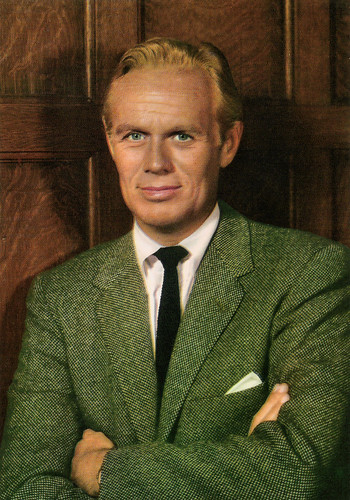
Italian postcard by Rotalcolor, Rotalfoto, no. 140.

French postcard by Huit, Paris, no. B 3. Photo: ISV / 20th Century Fox. The card refers to Richard Widmark's role in The Last Wagon (Delmer Daves, 1956). Huit was probably the French licence holder of ISV.
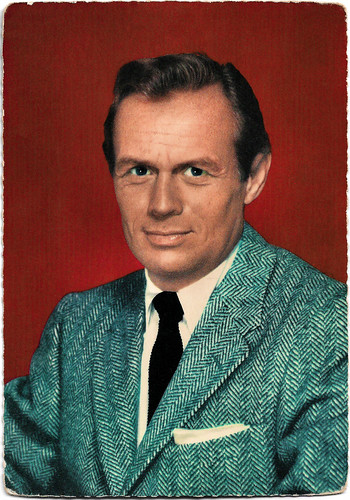
West-German postcard by ISV, no. B 25. Photo: M.G.M. Publicity still for The Tunnel of Love (Gene Kelly, 1958).
Cold-heartedly pushing an old woman in her wheelchair down the stairs
Richard Weedt Widmark was born in Sunrise County, Minnesota, in 1914. His parents were Carl Henry Widmark, a Swedish immigrant and travelling salesman, and his wife Ethel Mae Barr.
Widmark could already read before he went to school and studied law after graduation to become a lawyer. He also became enthusiastic about acting at an early age. In 1938 Widmark moved to New York with his future wife Jean Hazlewood, a screenwriter he had met as a colleague in Lake Forrest, and married her in 1942. Their only child, Anne Heath Widmark, was born in 1945.
In 1943 Widmark made his Broadway debut in George Abbott's theatrical production of 'Kiss and Tell'. Widmark worked as a radio announcer for ten years before making his film acting debut.
Widmark made his breakthrough with his debut role as Tommy Udo in the Film Noir Kiss of Death (Henry Hathaway, 1947) starring Victor Mature. Udo is a criminal who cold-heartedly pushes a paraplegic old woman in her wheelchair down a flight of stairs in the film's most famous scene. For this role, he was nominated for an Academy Award for Best Male Supporting Actor.
Widmark received a seven-year contract with 20th Century Fox. After his successful debut, Widmark was initially confined to the role of the villain for years. He brought a new kind of deeply troubled or corrupt character to the screen: a hard-boiled type who does not actively court the audience's sympathy.
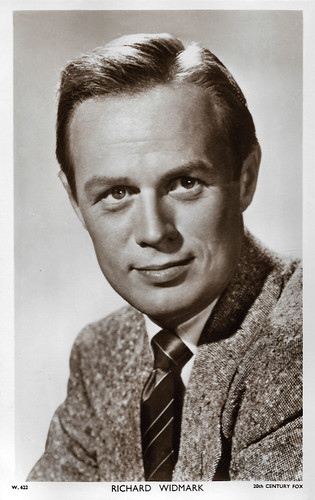
British postcard in the Picturegoer Series, London, no. W 622. Photo: 20th Century Fox.
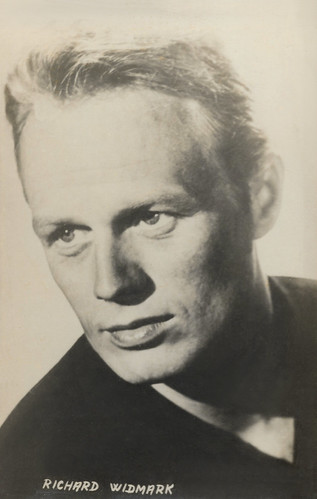
Vintage postcard.
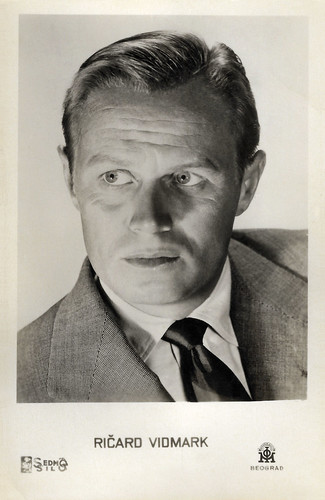
Yugoslavian postcard by Sedma Sila. Photo: IOM, Beograd.
A versatile leading man in all genres
In the 1950s, Richard Widmark managed to get away from this troubled villain type and establish himself as a versatile leading man in all genres.
Elia Kazan cast Widmark in his thriller Panic in the Streets (1950), not as the heavy but as the physician who tracks down Jack Palance, who has the plague, in tandem with detective Paul Douglas.
He went on to play notable roles as the penny-ante hustler Harry Fabian in the Film Noir Night and the City (Jules Dassin, 1950) with Gene Tierney, and an airline pilot who pursues a babysitter in his hotel (Marilyn Monroe) and gradually realises she's dangerous in Don't Bother to Knock (Roy Ward Baker, 1952).
Widmark appeared in two films for director Samuel Fuller: the Film Noir Pickup on South Street (1953) with Jean Peters and the Cold War drama Hell and High Water (1954) with Bella Darvi.
He later played in the Western The Alamo (John Wayne, 1960), the courtroom drama Judgment at Nuremberg (Stanley Kramer, 1961) starring Spencer Tracy, and the epic Western How the West Was Won (John Ford, Henry Hathaway, George Marshall, 1962).
Widmark produced and starred in the films Time Limit (Karl Malden, 1957) with Richard Basehart, The Secret Ways (1961) — based on a novel by Alistair MacLean, which Widmark also directed (uncredited) due to clashes with original director Phil Karlson's proposed tongue-in-cheek direction of the screenplay — and the Cold War thriller The Bedford Incident (James B. Harris, 1965), his third film with Sidney Poitier and loosely based on the Herman Melville novel 'Moby Dick'.
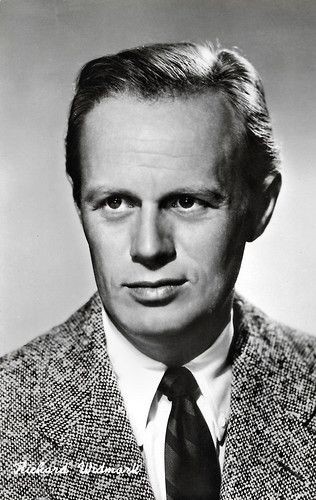
Belgian postcard by Bromophoto, Bruxelles.
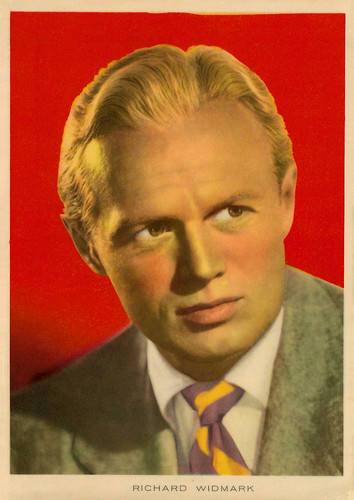
Italian postcard by Nannina, Milano.

West-German postcard by Rüdel-Verlag, Hamburg-Bergedorf, no. 228. Photo: 20th Century Fox.
A sought-after character actor
During the 1970s and 1980s, Richard Widmark advanced over the years to become a sought-after character actor. However, he still played the occasional lead, for instance in the British-West German film To the Devil a Daughter (Peter Sykes, 1976) with Christopher Lee and Nastassja Kinski.
He starred in such well-known films as the Agatha Christie adaptation Murder on the Orient Express (Sidney Lumet, 1974), the disaster thriller Rollercoaster (James Goldstone, 1977), the thriller Coma (Michael Crichton, 1978) starring Genevieve Bujold and Michael Douglas, and the Neo Noir Against All Odds (Taylor Hackford, 1984) with Jeff Bridges.
Widmark continued to appear in a number of films during the 1980s, again with Sidney Poitier who directed him in the comedy Hanky Panky (1982), with Gene Wilder. In 1987 he appeared with Louis Gossett jr. in Volker Schlöndorff's film A Gathering of Old Men, based on the novel 'A Gathering of Old Men' by Ernest J. Gaines.
In 1991 Richard Widmark appeared in front of the film camera for the last time in the political thriller True Colors (Herbert Ross, 1991) starring John Cusack. His last work was a voice-over for the television film Lincoln (Peter W. Kunhardt, James A. Edgar, 1992). Widmark spent his retirement in seclusion on his farm in Connecticut.
Widmark was first married for 55 years to Jean Hazlewood from 1952 until her death in 1997. In 1999, he married Susan Blanchard, who had previously been married to Henry Fonda, and remained with her until his death. In 2008, Richard Widmark died at home in Roxbury, Connecticut, at the age of 93. His death followed a fall in 2007, which he did not recover from. He was buried at Roxbury Center Cemetery.
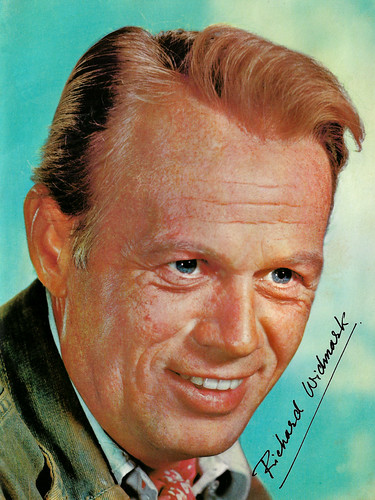
Big Dutch collectors card.
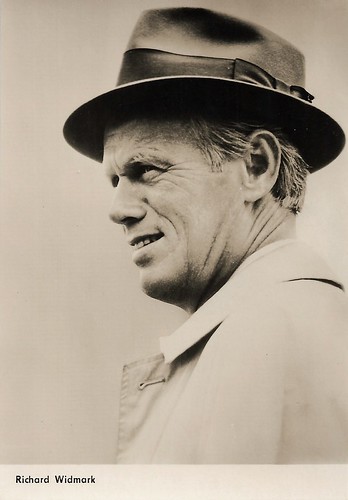
East-German postcard by VEB Progress Filmvertrieb, Berlin. no. 3097. Photo: Steffen. Richard Widmark, the postcard refers to his historical film Cheyenne Autumn (John Ford, 1964), even if here he appears in a modern outfit.

East-German postcard by VEB Progress Film-Vertrieb, Berlin, no. 3149, 1968. Richard Widmark in Cheyenne Autumn (John Ford, 1964).
Sources: Martin Lewison and Jon C. Hopwood (IMDb), Wikipedia (Dutch, English and German) and IMDb.
No comments:
Post a Comment